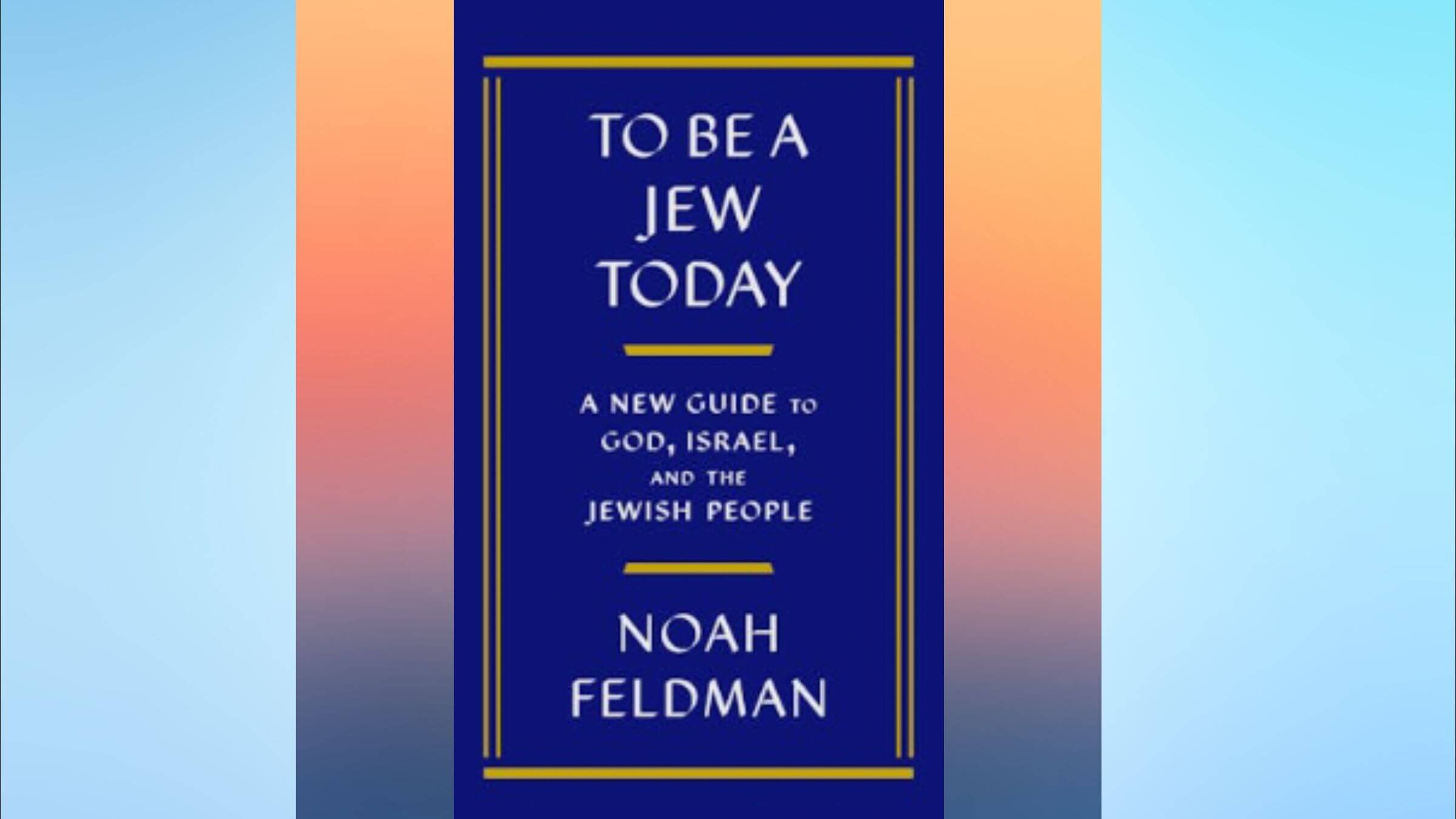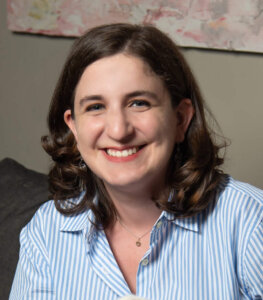A penetrating new book asks: What does it mean to be Jewish, especially now?
In ‘To Be a Jew Today: A New Guide to God, Israel, and the Jewish People,’ Harvard professor Noah Feldman turns his professional gaze on himself

Noah Feldman’s latest book is also his most personal. Graphic by Nora Berman; Farrar, Straus and Giroux
What does it mean to be a Jew in America today? And what does it mean to write a guide for being a Jew in America today, a moment when Jews in America publicly and passionately disagree over how to be Jewish?
The first is the question at the core of Noah Feldman’s new book, To Be a Jew Today: A New Guide to God, Israel, and the Jewish People. The second was what I wanted to try to understand by speaking with him.
To Be a Jew Today, as the title suggests, looks at Jewishness as it involves Judaism, the religion; Israel, the Jewish state; and Jews, a people. While Feldman, a Harvard law professor, wrote it over the last three years, the book is coming out now, as Jews in the United States and around the world are vehemently contesting how to be a Jewish person in the world, and what, if any, connection they hold to the Jewish state.
Feldman’s book reconciles competing understandings by putting forth his vision of Jewishness: that to be a Jew is to struggle lovingly, with ourselves, with other Jews, and with Israel, because Judaism itself is a loving struggle.
This is the way “the Bible explains the meaning of the name Israel: to strive, struggle, and contend with God,” Feldman writes. The nature of the struggle varies from Jew to Jew, yet “anyone who embraces the self-definition of belonging to the people of Israel, in whatever way, will find something powerful and familiar and meaning-making in the process.”
Worldview over shul-view
Feldman introduces three different Jewish ways of looking at the world, as opposed to the more familiar denominations. First there are the traditionalists, for whom God is “all-powerful, all-knowing, and all-authoritative”; progressives, who are “actively reviewing and revisiting God’s laws and God’s words with an eye toward extracting a moral truth from them”; and evolutionists, who “in principle accept God’s authority and joyfully embrace the contention of Talmudic reasoning” but at the same time “seek to understand what morality requires, so as to evolve the law in that direction.”
The general idea is that readers need not think of themselves only according to where they go to shul (or don’t — there is a chapter on Jewish atheists, too). The division is not denomination, but worldview: the particular variety of struggle that makes most sense to the reader.
His hope with these categories is that “every reader could find themselves somewhere in the range of options that I’m offering, even if they’re somewhere at the boundaries.” He himself, he said, has held all of these views. “Sometimes at the same time.”
Crisis over Israel
Israel the country, meanwhile, takes up more place and prominence in Jewishness than it once did, according to Feldman. In the years immediately after its founding, Israel moved from the periphery to the center of American Jews’ understanding of ourselves and our Jewishness. In this way, form reflects content — a good portion of the book is about Israel, and how it came to mean more to American Jews across religious lines.
Feldman believes that so many American Jews understand their own sense of Judaism and Jewishness through Israel because it offers a powerful answer to the question, “Why be Jewish?” But particularly for those in Feldman’s “progressives” category, Israel’s occupation of the West Bank and war in Gaza is at obvious odds with a worldview grounded in social justice. This friction ignited, in Feldman’s words, a “looming crisis” that threatens that “a new generation finds itself alienated from a Jewishness whose inner contradictions it cannot reconcile.”
I pointed out that Jews do not agree on what that looming crisis is. For some, it is that their adult children no longer support Israel; for others, it is that they see their communities, and even their own families, defending Israel even as it kills tens of thousands and starves over half a million people.
“I think the crisis really is, fundamentally, the split between the generations on this question,” he said. Both do see Israel in terms of social justice, he said. It’s just that, for older generations, supporting what is just means supporting Israel, which they believe “needs to be assisted and helped to represent liberal democracy as much as possible,” whereas, increasingly, younger Jews see Israel as acting in a way that is inconsistent with social justice and their values.
Ironically, one recent example of this divide involves Feldman, who, in a Time cover story on antisemitism, wrote that the core of new antisemitism was understanding Jews as oppressors. “To emphasize the narrative of Jews as oppressors,” he explained, “the new antisemitism must also sidestep not only two millennia of Jewish oppression, but also the Holocaust, the largest organized, institutionalized murder of any ethnic group in human history.” The piece was forcefully pushed back on by other writers, some of whom are Jewish, who made the case that the state of Israel, which occupies the West Bank and has killed tens of thousands in Gaza, should indeed be considered oppressive.
Feldman went back and revised the book after Hamas’ Oct. 7 attack, he told me. The core arguments remained the same, but he was able to add in examples that drove home how central Israel is to understandings of how to be Jewish, and how much pain people are in as they think and argue about it.
Different people join the Jewish family differently
Feldman concludes his book by looking at Jewish peoplehood. Jews, he writes, are a family, in that different people join the family in different ways. People may disagree over whether his ex-wife’s mother is part of his family, he tells me, and as it is in life, so it is in Judaism. Different people understand who is in the Jewish family differently, and that is alright.
In fact, he said, “If you study the history of Jewish communities, and you go all the way back and all the way forward, there’s been no moment to Jewish life — none — where it’s been clear” exactly who is in and who is out.
That’s how it is, he said, when it comes to long-lasting families, returning again to the theme of struggle. To imagine Jews as a family, he said, is to see love combined with struggle. Family is where we first learn what it means to love and be loved, and family is where we first learn what it is to challenge and be challenged. “That’s why the God of the Bible, the God of the rabbis, the God of contemporary Judaism is depicted as loving, but also as being in a kind of familial struggle at the same time.”
To be a Jew today, in Feldman’s book, is to be connected, and to find meaning, and to love, but also to argue and challenge and bend and bend and bend, but not break.
Reflecting on our conversation, it occurred to me that there is another element integral to being part of a family, which is that we are stuck together. It’s the same thing I think when I receive an email telling me that I am not really Jewish, or am a self-hating Jew and therefore have no business writing pieces like this one. By insisting that yes, I do have the right to examine and question my Jewishness, I am insisting that that email writer and I are stuck together in the Jewish tribe.
Feldman ultimately asks readers to think through seriously what it means to be a family and to be stuck in community with others. In that sense, he has written an appealing guide, or at least mapped out a starting point, for being a Jew today.





















